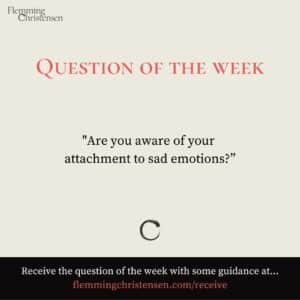We might find a path of development when we understand the difference between true and false emotions.

(Read more about how your blind Enneagram Type can suppress your emotions)
We also have to understand the difference between true and false emotions, where true emotions are more like a state and where false emotions are caused by others (often connected with blame or an attachment to a certain idea about how things should be).
When you are attached to your sad emotions, the attachment can have different energies or expressions. You may obtain something valuable from the attachment, like empathy from others, or you might feel authentic by the attachment. You may also want to distract yourself from the sadness, maybe because you do not know how to stay in difficult emotions or have the idea that it makes you look weak, incompetent, etc.
On the positive side, “Attachment” to your difficult emotions can for a shorter period of time give you access to new sides or perspectives of your personality that can be used in art or other kinds of expressive activities. You might also get closer to deeper layers of motives by exploring what might be beyond the emotion or drivers for the attachment. The attachment can also build a longing for a deeper meaning or understanding of attachment, identifications and emotions.
Artists like Vincent van Gogh, Ernest Hemingway, Charles Dickens, Hans Christian Andersen, Victor Hugo and John Lennon have found a way of using the attachment to difficult emotions to create poetry, literature and music that readers and listeners are touched by for centuries. People like Victor Frankl and Henri Dunant also used their experiences with sadness, sorrow and suffering to create philosophies and organizations that help and support others.
The negative side, “Attachment” to your difficult emotions, could be about neglecting important elements in your life, causing trouble to yourself and your professional and personal relations, being friends, partner, child, family etc. Attachment can also lead to cognitive distortions and unhealthy biases where you do not see reality as it is.
Examples of the negative aspects could be difficulties in handling stress, feedback, anxiety, depression, fatigue etc. It is not a question of whether we will meet difficult situations in our lives; the question is how we embrace them. And a strong attachment to difficult emotions can lead to an identification with such emotions and a very unhealthy way.
It might also be useful to remember that difficult emotions are patterns or structures of our personality and not who we are. Being authentic is not to be attached or identified with our emotions, as our authentic self is much much more than patterns and structures of our personality.
Your weekly question
This week’s question is about how you use attachment and detach from difficult emotions.
- How do you create awareness of your emotions to be aware of any unhealthy or healthy attachment?
- What is your practice to know if your emotions are true or false?
- How do you react when someone else is attached to their difficult emotions?
Your weekly quote
We can not escape difficult times, and if we try, they will ride with us as silent followers until the day we halt and explore their faces.
Your weekly recommended reading
How to find and accept your Blind Spots and set yourself free

